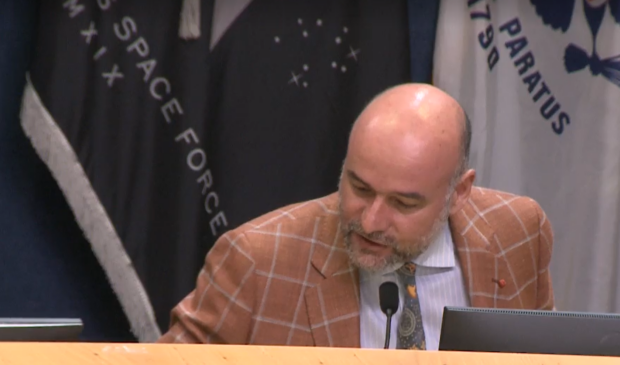Photo by ATXN. Before City Council OK'd Austin's next budget, Council Member Chito Vela proposed an amendment delaying the transfer of 37 full-time civilian staff positions to the Austin Police Department.
Council delays transfer of 37 civilian position to APD, citing transparency concerns
Tuesday, August 22, 2023 by
Emma Freer Before City Council approved the Fiscal Year 2023-24 budget, which includes record-high police funding, District 4 Council Member Chito Vela proposed an amendment delaying the transfer of 37 full-time civilian staff positions to the Austin Police Department, citing a need for more clarity.
Although city staff attempted to answer Vela’s questions and to dissuade such a delay, Council ultimately approved Vela’s amendment 7-4, with Mayor Kirk Watson and Council members Mackenzie Kelly, Leslie Pool and Alison Alter opposed.
Vela questioned how the proposed transfer – of 25 Human Resources Department, eight Development Services Department and four Communications and Public Information Office employees – might affect public access to records affiliated with those positions.
“I’d like to get a little bit more time to understand and vet,” he said during an Aug. 16 work session prior to Council’s adoption of the budget. “For example, I don’t know, at this point, what records HR holds that could be relevant.”
Vela also mentioned police reform advocates’ opposition to the proposal and the May passage of Proposition A, which aims to strengthen civilian oversight of the police by directing the city to codify expanded authority for the Office of Police Oversight in future labor contracts.
“The passage of (Proposition A), I think, was a strong signal from the community in favor of the maximum transparency within the police department with regard to, really, any and all documents,” Vela said during the work session.
In response, Chief Financial Officer Ed Van Eenoo told Council members that large departments commonly have their own human resources personnel, for instance, who report to that department’s leadership rather than to the head of corporate human resources.
City Attorney Anne Morgan emphasized that state law and the police labor contract, when there is one in place, determine public access to police records. She added that the city must request permission from the state attorney general to withhold information in response to a public information request.
“It doesn’t matter which department (city staff are) sitting in,” she said. “The documents that we’re releasing are governed by the nature of those documents, the substance of those documents.”
Assistant City Manager Bruce Mills urged Council not to delay the transfer, saying that the addition of human resources staff to the police department could improve efficiency and minimize payroll problems. The police department continues to respond to staffing shortages with frequent overtime.
Interim City Manager Jesús Garza was more blunt, telling Council members that, although they have “the power … and the policy capability” to approve such delays, personnel decisions should reside with his office.
“Whoever sits in this seat after I leave has to be able to move the boxes the way they need to move them so that this organization” is responsive to and meets the demands of not just certain members of the public, but all the public, he said. “And I just want to say that, for the record, that really makes me uncomfortable about some of these discussions that we’re having.”
Watson agreed with city staff, saying that opposition to the delay and support for Proposition A weren’t mutually exclusive.
Public feedback also was divided.
Chris Harris, policy director for the Austin Justice Coalition, spoke against the transfer during public comment.
“(While) we continue to have a budget that threatens transparency by moving HR and (public information officer) positions into APD … we must call this budget misguided,” he said.
Pam Madere, vice president of the Greater Austin Crime Commission, supported the proposal, which she said was part of an “essential investment that’s needed in public safety for our community, (which) is so desperate for additional resources and help right now.”
The FY 2023-24 budget takes effect on Oct. 1.
The Austin Monitor’s work is made possible by donations from the community. Though our reporting covers donors from time to time, we are careful to keep business and editorial efforts separate while maintaining transparency. A complete list of donors is available here, and our code of ethics is explained here.
You're a community leader
And we’re honored you look to us for serious, in-depth news. You know a strong community needs local and dedicated watchdog reporting. We’re here for you and that won’t change. Now will you take the powerful next step and support our nonprofit news organization?


 $2M for shade structures at City parks
$2M for shade structures at City parks $800K for spay/neuter services
$800K for spay/neuter services $2M for a mental health diversion center (w/
$2M for a mental health diversion center (w/ $1.6M for tenant stabilization
$1.6M for tenant stabilization $196k for language access
$196k for language access FY 23-24 Budget
FY 23-24 Budget





